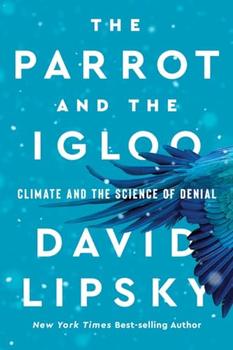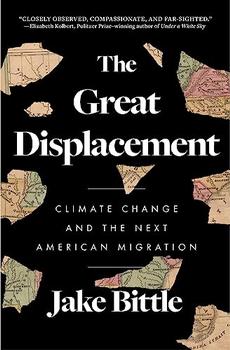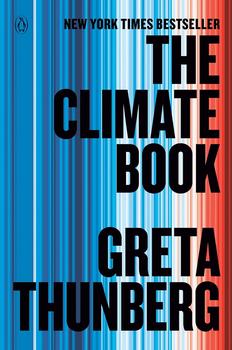Summary | Excerpt | Reviews | Beyond the book | Read-Alikes | Genres & Themes | Author Bio

Climate and the Science of Denial
by David LipskyDavid Lipsky's nonfiction book The Parrot and the Igloo is an in-depth look at the development of climate change denial and the deliberate erosion of public trust in science. The book is divided into three sections: inventors, scientists, and deniers. Through these, Lipsky traces first the rise in use of fossil fuels, then the hard work and dedication that allowed scientists to understand climate change and its causes, and finally, the development of denial strategies to protect harmful industries such as tobacco and the refinement of those strategies for use in climate change denial.
The first section, which covers the development of technology that led to widespread use of electricity, is both the shortest and the weakest. It is well-written, but I found it frustrating to pick up a book about the politics of climate change and find myself reading about Samuel Morse's financial troubles and Thomas Edison's work as a telegraph operator. While the connection between the inventions discussed and the increase in fossil fuel usage is clear, this section doesn't add much to the main arguments of the book.
The second section takes us back to the end of the 18th century, when French scientist Jean-Baptiste Joseph Fourier traveled with Napoleon to Egypt. This trip inspired him to investigate how the Earth retains heat and led to the first iteration of the greenhouse theory, wherein the atmosphere traps heat much like the glass of a greenhouse. From there, Lipsky traces the steady development of the science of climate and climate change. This section is not, however, purely focused on scientific discovery—from the start, Lipsky includes public and governmental response, or lack thereof, to expanding knowledge.
In the final and longest section, Lipsky examines the development of the climate change denial movement. He demonstrates how the tobacco industry's fight to deny the health effects of smoking acted as a trial run for the methods climate change deniers have perfected today. This includes such tactics as preventing legislation by insisting more research is still needed, recruiting spokespeople who have (or appear to have) trustworthy credentials, and discrediting the scientific method. These strategies, which bought the industry "an extra twenty or thirty years" according to tobacco lawyer Dave Hardy, were applied directly to climate change. Over and over again, calls for climate action have been put off with urging for more research. Some industry-sponsored scientists, such as Dr. Fred Singer, moved directly from one denial cause to the other.
Lipsky's writing is quick-witted and highly entertaining. He expertly manages the tone—moments of humor balance out the often-grim subject matter without trivializing it. His depiction of the people involved is personal and vivid, full of funny descriptions and insightful commentary. He also knows when to stand back and let people speak for themselves, from climate scientist Dr. Jim Hansen's moving declaration, "I don't want to be in a position where a few decades from now, my grandchildren say 'Opa understood what was going to happen, but he never tried to make it clear,'" to former Pentagon official and current lobbyist Jim Tozzi's frank admission, "Environmentalists said I operated in the back room and listened to lobbyists who told me to water down environmental regulations. I sure as hell did."
Lipsky reveals not only the mechanics of denial, but also its horrifying effects—in 2016, the most-shared climate information on Facebook was a petition against emission limits signed by such experts as "Dr. Red Wine" and "W.C. Lust." The most-clicked YouTube video on climate change is a speech by denier Christopher Monckton in which "nearly every point" is incorrect. Meanwhile, as of 2021, 19 of the 20 hottest years on record have been in the 21st century. The Parrot and the Igloo is a disturbing breakdown of how anti-science rhetoric gained first a foothold, and then a major following in American politics. Well-researched and captivatingly written, it's a must-read for people seeking to understand how climate change became the subject of such vicious denial.
![]() This review was originally published in The BookBrowse Review in August 2023, and has been updated for the
July 2024 edition.
Click here to go to this issue.
This review was originally published in The BookBrowse Review in August 2023, and has been updated for the
July 2024 edition.
Click here to go to this issue.

If you liked The Parrot and the Igloo, try these:

by Jake Bittle
Published 2024
The untold story of climate migration—the personal stories of those experiencing displacement, the portraits of communities being torn apart by disaster, and the implications for all of us as we confront a changing future.

by Greta Thunberg
Published 2024
We still have time to change the world. From Greta Thunberg, the world's leading climate activist, comes the essential handbook for making it happen.
Your guide toexceptional books
BookBrowse seeks out and recommends the best in contemporary fiction and nonfiction—books that not only engage and entertain but also deepen our understanding of ourselves and the world around us.